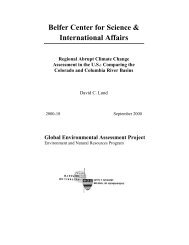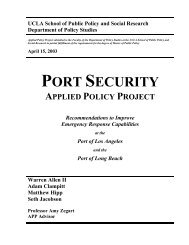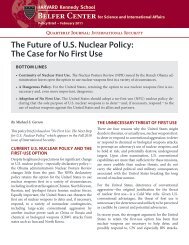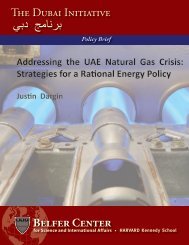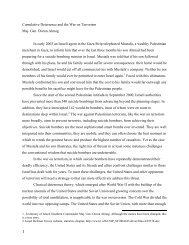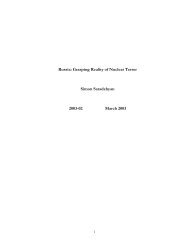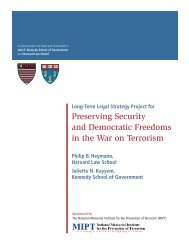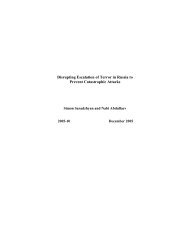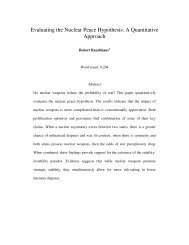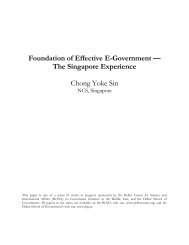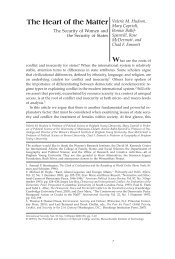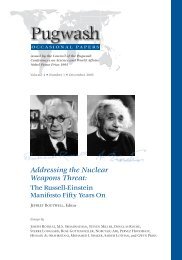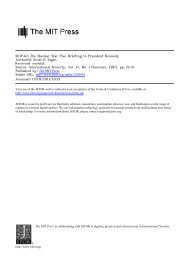RUSSIA'S TINDERBOX - Belfer Center for Science and International ...
RUSSIA'S TINDERBOX - Belfer Center for Science and International ...
RUSSIA'S TINDERBOX - Belfer Center for Science and International ...
You also want an ePaper? Increase the reach of your titles
YUMPU automatically turns print PDFs into web optimized ePapers that Google loves.
In response to the refusal of the KNK to participate, the Congress presented itself as the<br />
KNK’s “democratic” alternative. Yet, its establishment was not accompanied by any larger political<br />
strategy <strong>and</strong> no concerted ef<strong>for</strong>t was made to create a broad social base of support <strong>for</strong> the Congress<br />
in the region. The Ministry was very much the initiator of the conference <strong>and</strong> most of the<br />
movements that were represented in the Congress either were affiliated with small national groups or<br />
were amorphous organizations with democratic orientation but no political influence. 64<br />
There were nonetheless some positive results from the conference in Piatigorsk. A North<br />
Caucasus Economic Association was created to promote the economic development of the region<br />
<strong>and</strong> a series of “round-tables” were established to bring together representatives of the political<br />
<strong>for</strong>ces in the region <strong>and</strong> the federal government. The round-tables, in turn, encouraged the <strong>for</strong>mation<br />
of Consultative Councils in the regional parliaments which became a <strong>for</strong>um <strong>for</strong> all the political<br />
parties in an individual republic. Thus an institution to promote continuous dialogue between the<br />
ruling elite <strong>and</strong> the opposition national movements was established. 65 This represented a very small<br />
step toward promoting cooperation with the new political <strong>for</strong>ces in the North Caucasus.<br />
The most recent of Moscow’s ef<strong>for</strong>ts at organization-building is the <strong>International</strong> Congress<br />
of Highl<strong>and</strong>ers (in Russian the Mezhdunarodnyi Kongress Gortsev) which looks even further afield<br />
than the Russian Federation in its activities. 66 This organization, like the Association of Peoples of<br />
the Caucasus, was also created at the initiative of Ramazan Abdulatipov <strong>and</strong> held its founding<br />
Congress in Dagestan in July 1994. The <strong>International</strong> Congress seeks to tap in on increased<br />
interest in the North Caucasus from international companies <strong>and</strong> Western analysts in order to attract<br />
<strong>for</strong>eign investment to the region. The coordinating council <strong>and</strong> the secretariat of the Congress are all<br />
housed in the Analytical <strong>Center</strong> of the Council of Federation, which is staffed by a group of<br />
Moscow-based analysts headed by Abdulatipov. 67<br />
Apart from creating this succession of weak organizations, the Russian government has done<br />
little to address the persistence of conflict in the North Caucasus. Since the March 1993 decree on<br />
creating Cossack military structures, the only other concrete government action has been the<br />
intervention in Chechnya. An August 1995 press report sums up the Russian government’s approach<br />
toward the region: when representatives of the administrations of all the republics, krais <strong>and</strong> oblasts<br />
of the North Caucasus met in Moscow in August 1995 to establish an extensive program <strong>for</strong> the<br />
64 See Larisa Khaperskaya, “Analysis of the Ethno-Political Situation in the North Caucasus,” in CMG Bulletin,<br />
May 1994, pp. 20-25; <strong>and</strong> Vasil’eva <strong>and</strong> Muzaev, p.17.<br />
65 For a discussion of the conference in Piatigorsk see Vasil’eva <strong>and</strong> Muzaev, p. 48.<br />
66 The Congress initially referred to itself in official correspondence in English as the “<strong>International</strong> Congress of<br />
Mountaineers”––“Mountaineers” being the usual English term <strong>for</strong> Gortsy. But the coordinating council changed<br />
the name to the “<strong>International</strong> Congress of Highl<strong>and</strong>ers” in the summer of 1995 after some of the international<br />
groups it hoped to attract to its events noted that the English name evoked the image of a gathering of mountain<br />
climbers (alpinisty in Russian) rather than of North Caucasian peoples.<br />
67 In<strong>for</strong>mation from the Analytical <strong>Center</strong> of the Council of the Federation.<br />
29



